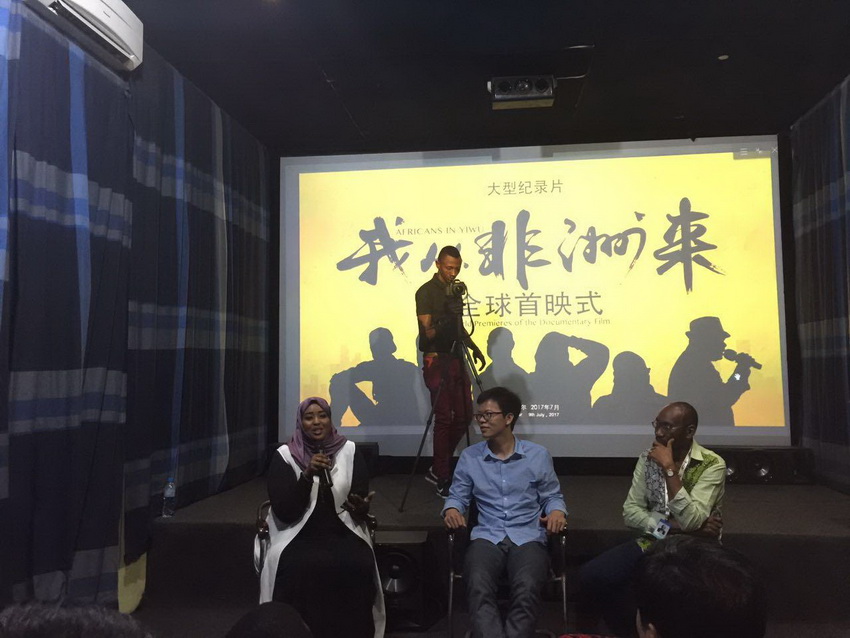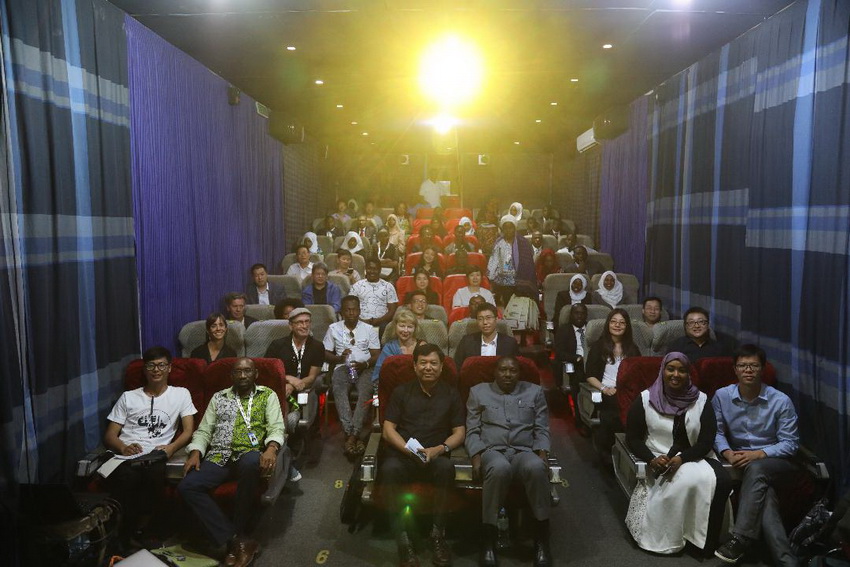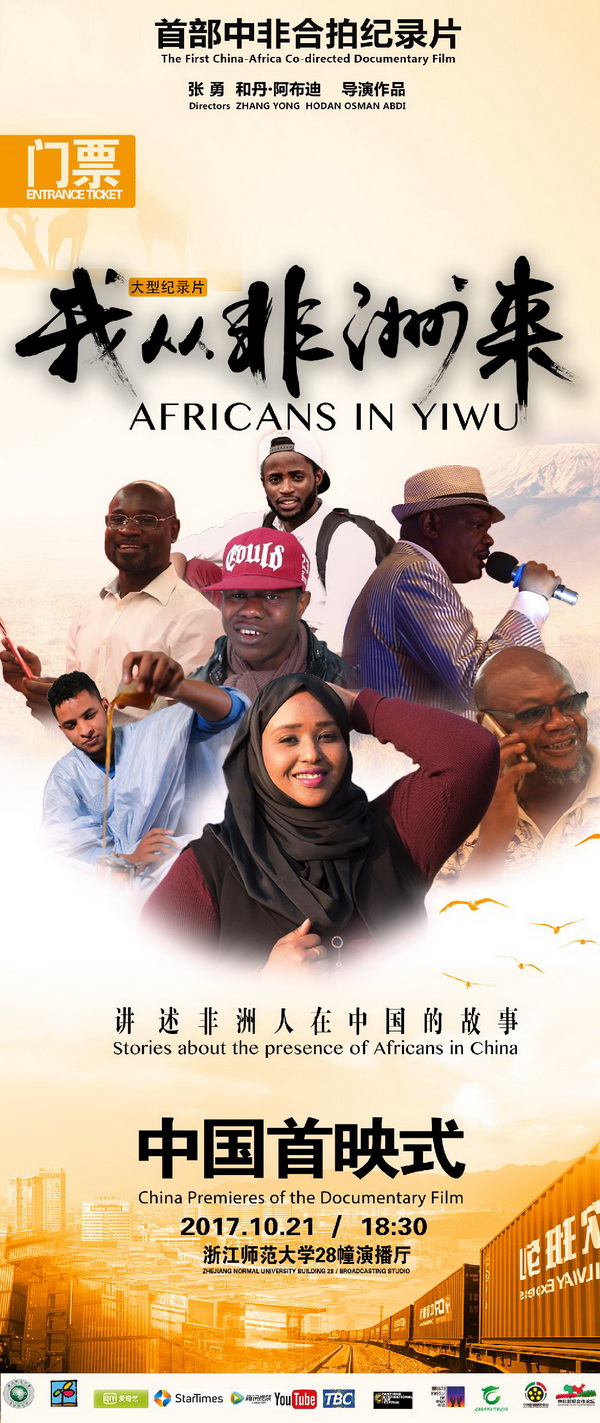


Interviews granted to promote the fim. Photo by Dr. Hodan Osman
As trade, people-to-people, cultural and educational exchanges between Africa and China increase, so also is the number of Africans settling in China. Their largest concentrations for now are in Guangzhou in Guangdong Province and Yiwu in Zhejiang Province – all in the coastal southern and eastern part of the country. All manner of stories are often told about the situation of Africans in China, largely based on hearsay or unverified information.
Africans tell their stories
In order to let Africans tell their own stories of life in China, two Chinese university lecturers decided to do a documentary film. Early in 2016, the two lecturers from Zhejiang Normal University, Jinhua, began shooting a six-episode, over three-hour-long documentary, “Africans in Yiwu,” produced by Liu Hongwu. “We wanted to use the power of film to get our message to the biggest and widest audience by using a unique new lens of a combined Chinese and African vision,” explained Dr. Hodan Osman Abdi, one of the directors.
“We followed the lives of over 20 individuals from different African countries for two years, documenting their journeys of self development and achievements,” said Somali-born Dr. Hodan Osman, a full-time researcher and lecturer with the Institute of African Studies, Zhejiang Normal University. She is also the Vice Director of the Centre for African Film and TV Studies in the same university. Hodan said she and her Chinese colleague and co-director of the documentary, Zhang Yong, a PhD holder from Beijing Film Academy, embarked on the project because they wanted to contribute to the global discourse on the presence of Africans in China.
Positive responses
“The idea of the documentary was conceived by Zhang Yong. We began shooting in early 2016 and have just finished. We are now in the final editing stages. It is the first documentary film to be co-directed by a team of Chinese and African directors,” Hodan noted. “Africans in Yiwu” was screened at the Zanzibar International Film Festival in Tanzania and was chosen as the opening film for the Lusaka International Film Festival in Zambia.

Zanzibar audience watches projection of 'fricans in Yiwu. Photo by Dr. Hodan Osman
“At both festivals, our film received great responses. It has been hailed by the Chinese, African and Western media as a welcome addition,” Hodan said. The directors have been invited to screen the film at several venues, including the V&A Museum in London, Duke University and the London School of Economics. Later this month, excerpts of the film will be shown at the Somali Week Festival as part of activities marking Africa History Month in the UK.
Similarly, agreements have been signed with the Tanzanian Broadcasting Corporation and the Zambian Broadcasting Agency to promote the documentary film. “We have also signed a deal with StarTimes to broadcast the film across Africa. Since we were busy filming and editing the film, our overseas marketing was limited to creating a website, www.africansinyiwu.com. We have uploaded our trailers and clips on YouTube and Facebook, and also granted interviews to international media,” Hodan said.

Poster announces the screening of 'Africans in Yiwu.' Photo by Dr. Hodan Osman
Future projects
The Centre for African Film and Television Research, Zhejiang Normal University plans to make more documentary films to continue to showcase the realities of China-Africa relations, Dr. Hodan Osman Abdi disclosed. According to her, relations between China and Africa are quite unique. Both China and Africa need each other, she believes. Therefore, there is need for both sides to foster understanding and create the necessary environment for better cooperation.
About Africa taking advantage of its relations with China, Hodan says each African country has its priorities. “Those that give great priority to national development are certainly making keen efforts to capitalize on China's potentials in this field. However, African countries can do more to break away from historical frameworks of cooperation and aid, and try to understand the new models proposed by China,” she advised.
“They can begin with a deeper look and study of the opportunities their countries possess and come up with feasible plans for cooperation with one of the world’s largest and most influential developing countries. China’s key advantage is its experience in the past three decades. African countries should make serious efforts to learn more about China’s development experience and poverty reduction,” Hodan suggested.
Somali girl becomes university lecturer
Hodan Osman Abdi arrived in China in September 2005 after completing high school. She learned Chinese language at Yangzhou University for a year before beginning a Bachelor’s degree at Zhejiang Normal University in 2006. She graduated a year earlier with a Bachelor’s degree in Business and Management; and went on to read a Master’s degree in teaching Chinese as a second language in the same university.
Upon graduation in September 2011, Hodan enrolled for a doctorate, still in Zhejiang Normal University. She graduated with a PhD in Communication Studies in June 2016. Since joining the institute, Dr. Hodan Osman Abdi has been involved in several projects and activities, including organising the second China-Africa Film and Television Cooperation Forum in Zanzibar, Tanzania in July 2017.
Kimeng Hilton Ndukong, a contributor to People’s Daily Online, is Sub-Editor for World News with Cameroon Tribune bilingual daily newspaper in Cameroon. He is currently a 2017 China-Africa Press Centre, CAPC fellow.

 Award-winning photos show poverty reduction achievements in NE China's Jilin province
Award-winning photos show poverty reduction achievements in NE China's Jilin province People dance to greet advent of New Year in Ameiqituo Town, Guizhou
People dance to greet advent of New Year in Ameiqituo Town, Guizhou Fire brigade in Shanghai holds group wedding
Fire brigade in Shanghai holds group wedding Tourists enjoy ice sculptures in Datan Town, north China
Tourists enjoy ice sculptures in Datan Town, north China Sunset scenery of Dayan Pagoda in Xi'an
Sunset scenery of Dayan Pagoda in Xi'an Tourists have fun at scenic spot in Nanlong Town, NW China
Tourists have fun at scenic spot in Nanlong Town, NW China Harbin attracts tourists by making best use of ice in winter
Harbin attracts tourists by making best use of ice in winter In pics: FIS Alpine Ski Women's World Cup Slalom
In pics: FIS Alpine Ski Women's World Cup Slalom Black-necked cranes rest at reservoir in Lhunzhub County, Lhasa
Black-necked cranes rest at reservoir in Lhunzhub County, Lhasa China's FAST telescope will be available to foreign scientists in April
China's FAST telescope will be available to foreign scientists in April